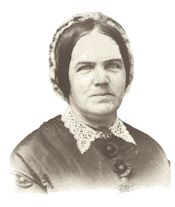July 22, 1864.
[The day of the battle of Atlanta]
We have heard the loud booming of cannon all day. Mr. Ward [the overseer] went over to the burial of Thomas Harwell, whose death I witnessed yesterday. They had but just gone when the Rev. A. Turner, wife, and daughter drove up with their wagons, desiring to rest awhile. They went into the ell [a large back room] and lay down, I following them, wishing to enjoy their company. Suddenly I saw the servants running to the palings, and I walked to the door, when I saw such a stampede as I never witnessed before. The road was full of carriages, wagons, men on horseback, all riding at full speed. Judge Floyd stopped, saying: “Mrs. Burge, the Yankees are coming. They have got my family, and here is all I have upon earth. Hide your mules and carriages and whatever valuables you have.”
Sadai [Mrs. Surge’s nine-year-old daughter] said:
“Oh, Mama, what shall we do?”
“Never mind, Sadai,” I said. “They won’t hurt you, and you must help me hide my things.”
I went to the smoke-house, divided out the meat to the servants, and bid them hide it. Julia [a slave] took a jar of lard and buried it. In the meantime Sadai was taking down and picking up our clothes, which she was giving to the servants to hide in their cabins; silk dresses, challis, muslins, and merinos, linens, and hosiery, all found their way into the chests of the women and under their beds; china and silver were buried underground, and Sadai bid Mary [a slave] hide a bit of soap under some bricks, that mama might have a little left. Then she came to me with a part of a loaf of bread, asking if she had not better put it in her pocket, that we might have something to eat that night. And, verily, we had cause to fear that we might be homeless, for on every side we could see smoke arising from burning buildings and bridges.
Major Ansley, who was wounded in the hip in the battle of Missionary Ridge, and has not recovered, came with his wife, sister, two little ones, and servants. He was traveling in a bed in a small wagon. They had thought to get to Eatonton, but he was so wearied that they stopped with me for the night. I am glad to have them. I shall sleep none to-night. The woods are full of refugees.


